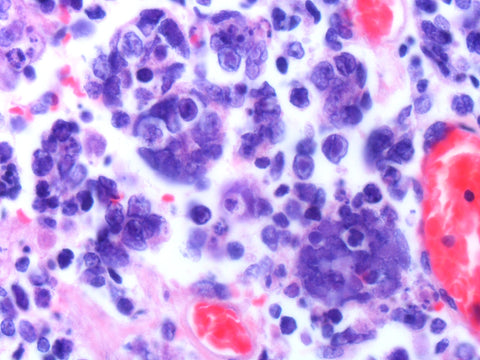
How To Prevent Spreading Cold Sores
If you think about cold sores, words that pop into your head probably include "unsightly," "painful," and "contagious." If you’re unsure on what a cold sore is; read our article on what they are and what causes them. More than half of all Americans have experienced a cold sore by the time they're in their twenties, so "common" might be another appropriate description for cold sores.
How Contagious Are Cold Sores?
Cold sores are very contagious and seem to spread easily. About 10 percent of people who are infected with type 1 herpes simplex will develop a cold sore within one to two weeks.
Cold sores are most contagious when they rupture — when fluid seeps out of the sores. But they're actually contagious from the time you first feel cold sore symptoms, like tingling or itching around your mouth, until they're completely healed and gone. Just because the cold sore is scabbed over doesn’t mean it's no longer contagious. Eat, talk, smile, and your scab can break and the fluid can leak out.
To protect other people, when you have cold sores, don't:
- Don’t kiss anyone. You can spread cold sores simply by getting up close and personal with your loved ones. Give a kiss anywhere, but especially the mouth, and you could easily pass on the virus.
- Don’t share. If you put it in your mouth, don’t share it. You can easily pass on your cold sores by sharing food, eating utensils, drinking straws, cups, and glasses. That goes for lip balm or lipstick, toothbrushes, and razors as well. Even towels you use to dry your face can be harbingers of the virus when you have a cold sore.
 Don’t touch. Every time you touch your cold sore with your hands, you could be spreading the virus. If the virus gets on your hands and you don’t wash them right away, it could spread to whatever you touch next — your keyboard, the phone, a doorknob.
Don’t touch. Every time you touch your cold sore with your hands, you could be spreading the virus. If the virus gets on your hands and you don’t wash them right away, it could spread to whatever you touch next — your keyboard, the phone, a doorknob.- Don’t engage in oral sex. The same virus that causes cold sores also can be responsible for blisters and sores in the genital area. When you have a cold sore, you don’t want your mouth to come in contact with your partner’s genitals.
- Use hot water. Wash any items you use in boiling hot water to kill the virus.
- Avoid triggers. One of the best ways to avoid spreading cold sores is to avoid getting them in the first place. Some things that may trigger an outbreak are stress, sunburn, fever, and illness.
- Consider cold sore treatment. Left untreated, it can take a week or more for cold sores to run their course. Apply a cold sore treatment quickly to prevent it from spreading to other parts of your body. If you treat your cold sore and it heals faster, you'll be contagious for a shorter time. Never squeeze or pick at your cold sore because that will delay healing.
Sources:
https://www.everydayhealth.com
https://en.wikipedia.org


 Don’t touch. Every time you touch your cold sore with your hands, you could be spreading the virus. If the virus gets on your hands and you don’t wash them right away, it could spread to whatever you touch next — your keyboard, the phone, a doorknob.
Don’t touch. Every time you touch your cold sore with your hands, you could be spreading the virus. If the virus gets on your hands and you don’t wash them right away, it could spread to whatever you touch next — your keyboard, the phone, a doorknob.